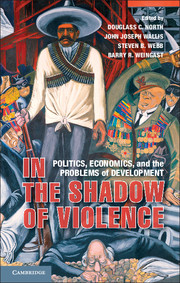Book contents
- Frontmatter
- Contents
- Contributors
- Acknowledgments
- One Limited Access Orders
- Two Bangladesh
- Three Fragile States, Elites, and Rents in the Democratic Republic of Congo (DRC)
- Four Seeking the Elusive Developmental Knife Edge
- Five Change and Continuity in a Limited Access Order
- Six India’s Vulnerable Maturity
- Seven Entrenched Insiders
- Eight From Limited Access to Open Access Order in Chile, Take Two
- Nine Transition from a Limited Access Order to an Open Access Order
- Ten Lessons
- Index
- References
Seven - Entrenched Insiders
Limited Access Order in Mexico
Published online by Cambridge University Press: 05 December 2012
- Frontmatter
- Contents
- Contributors
- Acknowledgments
- One Limited Access Orders
- Two Bangladesh
- Three Fragile States, Elites, and Rents in the Democratic Republic of Congo (DRC)
- Four Seeking the Elusive Developmental Knife Edge
- Five Change and Continuity in a Limited Access Order
- Six India’s Vulnerable Maturity
- Seven Entrenched Insiders
- Eight From Limited Access to Open Access Order in Chile, Take Two
- Nine Transition from a Limited Access Order to an Open Access Order
- Ten Lessons
- Index
- References
Summary
Introduction
Despite advances in social development and the presence of a very stable political order, during much of the twentieth century Mexico was unable to produce rapid economic growth. Even after dramatic economic transformations at the close of the century, including trade liberalization, privatization, and deregulation, economic performance has remained mediocre at best (Levy and Walton 2009). Democratization was a long and protracted process that only became a reality after a long delay, compared to political openings in Latin America and the rest of the world (Magaloni 2006). At the beginning of the twenty-first century the economy is stagnant; young men and women are unable or unwilling to find jobs in the modern formal economy (Levy 2008); and the state is unable to provide the most basic public good of controlling its territory and protecting its citizens from extortion and violence.
This chapter applies the theoretical framework developed by Douglass North, John Wallis, and Barry Weingast in their book Violence and Social Orders (2009) to the study of the social, political, and economic development of Mexico. In the context of this analytic lens, Mexico has already fulfilled what the authors call the “doorstep conditions” (rule of law for elites, perpetually lived organizations in the public and private spheres, and consolidated control of the military) that could enable it to transform into an open access order (OAO) society. But I argue that the prevailing political arrangement and the organization of economic interests have produced entrenched insiders who are preventing such transition.
- Type
- Chapter
- Information
- In the Shadow of ViolencePolitics, Economics, and the Problems of Development, pp. 233 - 260Publisher: Cambridge University PressPrint publication year: 2012
References
- 1
- Cited by



